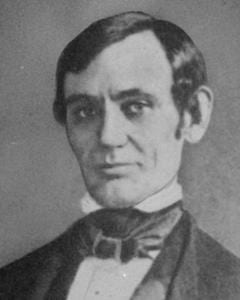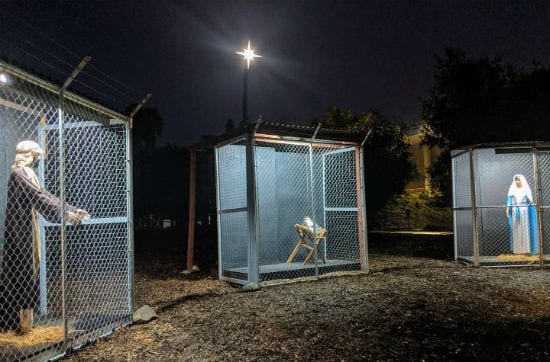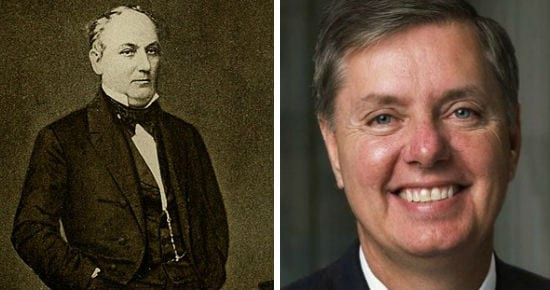"The sanctions exist … for the purpose of keeping in check Saddam Hussein's ambitions toward developing weapons of mass destruction. … And frankly they have worked. He has not developed any significant capability with respect to weapons of mass destruction. He is unable to project conventional power against his neighbors."
— Secretary of State Colin Powell, Feb. 24, 2001
"We are able to keep his arms from him. His military forces have not been rebuilt."
— National Security Advisor Condoleezza Rice, April, 2001
"We were all wrong," David Kay, the former chief weapons inspector told Congress on Jan. 29.
Kay's statement sent the Bush administration scurrying for a response. That response, as it turns out, has been to try to minimize that last word — "wrong" — by emphasizing the first three, "we were all."
This has become the official administration "talking point" on the question of Iraq's nonexistent Weapons of Mass Destruction. Literally. Josh Marshall provides a copy of the memo, which reads in part:
Widespread Consensus on Saddam's Threat
* From review of the same intelligence information there was consensus among:
* The intelligence community
* Successive administrations of both political parties
* The U.S. Congress
* Much of the international community (the U.N. passed 17 resolutions regarding Saddam's WMD).
The purpose of these "talking points" is to argue that everyone was wrong. That the misrepresentation and misinterpretation of Iraq's WMD threat was universal.
The problem with this assertion is that no such consensus existed. The "intelligence community" has been questioning the Bush administration's claims for two years to any reporter willing to take notes. Members of Congress are furious that they were denied access to information and fed misinformation during the months leading up to the invasion. And Bush ultimately broke his promise to guarantee a vote of the U.N. Security Council because he realized that body was wholly unconvinced by his argument.
This idea of a consensus is also based on a dishonest abuse of the elasticity of the phrase "weapons of mass destruction" — a category that has been broadened to include everything from nuclear weapons to mustard gas and castor beans.
In a post dismantling the imaginary consensus argument, Josh Marshall puts it this way:
the argument is that everyone thought Saddam had WMD. So it's not my mistake. It's everyone's mistake. …
When it comes to what constitutes a threat, all 'WMD' are not created equal. Mustard gas is close to irrelevant weighed against the threat of nuclear weapons, especially effectively deliverable ones. And on this there was in fact fierce and public disagreement.
This notion of a universal consensus is particularly puzzling — okay, infuriating — to those of us who were consistently skeptical of the Bush administration's arguments before, during and ever since the invasion of Iraq.
"We were all wrong," Kay said. To which, along with Hans Blix, Mohamed ElBaradei and Scott Ritter, I can only respond "What do you mean 'we,' paleface?"
Unlike those U.N. officials, I have no particular expertise in evaluating weapons programs and I have not spent months and years on the ground in Iraq inspecting the WMD allegations firsthand. So how did I, a private citizen in a one-bedroom apartment in Delaware County, Pa., get this right when so many in the administration got it so drastically wrong.
Well, I read the newspaper.
Kay's great "revelation" wasn't really all that revealing. It was merely an admission of what had been known — and recorded widely and extensively in the public domain — for more than a year.
As Washington Post ombudsman Michael Getler writes:
… a review of stories over the past year or so suggests that not everybody was wrong before the war.
We now know, for example, that the Defense Intelligence Agency reported in September 2002 that "there is no reliable information on whether Iraq is producing and stockpiling chemical weapons, or where Iraq has — or will — establish its chemical warfare agent production facilities." We know that the State Department's Bureau of Intelligence and Research reported that it "considers the available evidence inadequate to support such a judgment" that Iraq was pursuing "an integrated and comprehensive approach to acquire nuclear weapons," and that Energy Department experts did not agree that controversial aluminum tubes were part of a nuclear program. We now know that the Air Force's National Air and Space Intelligence Center disputed the notion that Iraq's unmanned aerial vehicles, or drones, were being designed as attack weapons.
That's a quick-skim, thumbnail sketch of the reporting from a single paper, but it demonstrates that the alleged "consensus" among the intelligence community is a fantasy. (And if Getler had looked back another year he would have found — as in the quotes above — that the Bush administration itself had, in the public record, been arguing the opposite of what it argued in the buildup to war.)
In his essay "Now They Tell Us," in The New York Review of Books, Michael Massing provides a more comprehensive picture of all this reporting:
Beginning in the summer of 2002, the "intelligence community" was rent by bitter disputes over how Bush officials were using the data on Iraq. Many journalists knew about this, yet few chose to write about it.
"Few," but not "none." The response to Massing's essay has mainly focused on journalists like The New York Times' Judith Miller, whose high-profile, alarmist reporting has since been thoroughly discredited (Miller doesn't like to admit it, but she's included in Kay's "we"). But he also provides an overview of the large amount of critical information that "few" journalists supplied in the months and years before the invasion of Iraq.
He particularly commends Knight-Ridder reporters Jonathan Landay and Warren Strobel for highlighting discrepancies in the administration's case for war, and the growing dissent among experts and intelligence analysts in the summer of 2002:
As these reports show, there were many sources available to journalists interested in scrutinizing the administration's statements about Iraq. … in mid-October [2002], other news organizations began to pick up on some of the same discontent Knight Ridder had documented. The Washington Post, the Associated Press, The Wall Street Journal, USA Today, the Los Angeles Times, and the Guardian of London all ran articles raising questions about the administration's case for war. On October 10, The New York Times ran a front-page account by Michael Gordon of the divisions within the administration "over what intelligence shows about Iraq's intentions and its willingness to ally itself with al-Qaida." And on October 24, the Times, again on its front page, reported that top Pentagon officials had set up a special intelligence unit to search for data to support the case for war. Written by Thom Shanker and Eric Schmitt, the article cited the concerns of some intelligence analysts that civilian policymakers were politicizing the intelligence to fit their hawkish position. The view "among even some senior intelligence analysts" at the CIA, they wrote, "is that Mr. Hussein is contained and is unlikely to unleash weapons of mass destruction unless he is attacked."
Beyond this small circle of elite newspapers a plethora of reports documented the outspoken objections of former intelligence analysts. These men (mostly men) were still in the loop, still privy to the best classified information that was supposed to be shaping policy. Yet they were freed from the political and chain-of-command considerations that caused their colleagues to be more muted in their criticism. And they found the administration's arguments laughably unsupportable.
Some 25 of these old hands banded together to form "Veteran Intelligence Professionals for Sanity," issuing memos like this one to the president and the media, although these were largely ignored.
The objections of such veteran analysts were notable due in part to their stature, their insider-access, and the fact that their speaking out entailed some risk and little self-interest. But what was most notable to me was the specificity of many of their claims. They offered detailed evidence and detailed responses to administration claims. The administration never responded with equally specific counter-evidence, it simply repeated its litany of assertions without providing support.
This absence of supporting evidence for the Bush administration's claims is another little-noted aspect of the pre-invasion debate that Massing highlights:
On August 26, 2002, Vice President Dick Cheney gave a speech that was widely interpreted as signaling the administration's intention to wage war on Iraq. There "is no doubt," Cheney declared, that Saddam Hussein "has weapons of mass destruction" and is preparing to use them against the United States. Saddam, he said, not only had biological and chemical weapons but had "resumed his efforts to acquire nuclear weapons." If allowed to continue on this course, he added, Saddam could subject his adversaries to "nuclear blackmail." Accordingly, the United States had no choice but to take preemptive action against him.
The reference to nuclear weapons was especially telling. While Iraq was widely believed to have biological and chemical weapons, there was much more uncertainty regarding its nuclear program. In 1998, when UN inspectors left the country, it was generally agreed that Iraq's nuclear program had been dismantled. The question was, what had happened in the four years since? In his speech, Cheney flatly stated that Iraq had resumed its quest for a bomb, but neither he nor any other Bush official offered any supporting evidence. [emphasis added]
For the evidence of "what had happened in the four years since" one could turn to ElBaradei and the inspectors of the International Atomic Energy Agency. ElBaradei was as unequivocal as Cheney, but he also supported his claims with facts, data, evidence. "We have to date found no evidence or plausible indications of the revival of a nuclear weapon program in Iraq," he said.
The most detailed explanation and defense of the Bush administration's argument for the invasion of Iraq was Secretary of State Colin Powell's Feb. 5, 2003, presentation to the U.N. Security Council. The speech was billed as a distillation of the best and strongest evidence the administration was able to muster. Yet it consisted largely of claims that had already been debunked or disputed earlier in the public record.
I found the presentation unimpressive (see "A Big, Steaming Powell," "Fool Me Once …" and the Cogent Provacateur's impressive "Colin Powell, the Adlai Moment and the O.J. Question"), which put me at odds with the editorial pages and editorializing TV anchors who hailed the speech as an irrefutable, unquestionable, overwhelmingly persuasive masterpiece.
Massing describes the reaction:
The speech, while viewed skeptically by most foreign governments, received high approval ratings in American polls — and rapturous reviews from the American press. …
The next day's New York Times carried three front-page articles on Powell's speech, all of them glowing. His presentation took "the form of a nearly encyclopedic catalog that reached further than many had expected," wrote Steven Weisman. According to Patrick Tyler, an "intelligence breakthrough" had made it possible for Powell "to set forth the first evidence of what he said was a well developed cell of al-Qaida operating out of Baghdad." The speech, he wrote, was "a more detailed and well-documented bill of particulars than many had expected."
The Washington Post was no less positive. "Data on Efforts to Hide Arms Called 'Strong Suit of Speech'" went one headline. "Agency Coordination Helps Yield Details on al-Qaida 'Associate'" went another. In an editorial titled "Irrefutable," the paper asserted that, after Powell's performance, "it is hard to imagine how anyone could doubt that Iraq possesses weapons of mass destruction." The Op-Ed page ran four pieces about the speech—all of them full of praise. "An Old Trooper's Smoking Gun," stated the headline atop Jim Hoagland's column. Even the normally skeptical Mary McGrory pitched in with a favorable assessment, headlined, "I'm Persuaded."
Massing goes on to describe the more skeptical — and more detailed, sourced and documented — articles questioning Powell's claims that were "tucked inside each paper."
More to the point, however, is his introductory caveat: the speech was "viewed skeptically by most foreign governments." Clearly, the administration hoped the speech would produce the reaction it did in opinion polls and editorial pages, but the primary audience for the speech was the members of the U.N. Security Council.
The main purpose of the speech was to persuade that council to accept the administration's argument and support its case for war. On that basis, the speech was an utter failure — failing to win even a single additional vote on the council and forcing Bush to renege on his vow to bring the matter to a council vote "no matter what."
In some circles, of course, the objections of these foreign diplomats can simply be ignored. The French, Germans, Russians, Chileans, Mexicans and Angolans are simply assumed to be perverse, corrupt or both. But these diplomats spoke candidly and in detail about why they were unpersuaded by Powell's presentation. They offered reasons. Yet these reasons were met with little response from the Bush administration — they were simply ignored or dismissed. Their reasons were never engaged, rebutted or refuted by those who now — along with David Kay — are finally having to confront the fact that they were "all wrong."
The point here, in any case, is that for whatever reason these members of the Security Council received, considered and rejected Powell's argument. I believe they were right in doing so. You may disagree.
But in either case, no one can pretend that their was a "consensus."
We did not all agree. Therefore, we were not all wrong.












